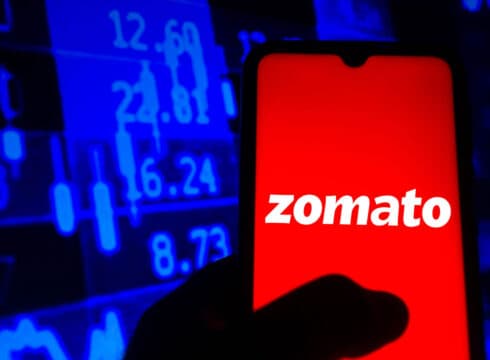Analysts at Jefferies are wary of a potential rise in competition in the sector as its biggest competitor, Swiggy, recently lost out on the market share
The move comes despite the brokerage firm citing Zomato as the dominant player in India’s food delivery sector
Several big-name investors have also sold stakes in Zomato, including Moore Strategic Ventures, Uber, Sequoia, Tiger Global and Alibaba
Inc42 Daily Brief
Stay Ahead With Daily News & Analysis on India’s Tech & Startup Economy
In a significant rejig of its portfolio in India, brokerage firm Jefferies has dropped foodtech major Zomato from its India portfolio, along with telecom giant Bharti Airtel as it onboards Tata Steel and Hindalco.
Analysts at Jefferies are wary of a potential rise in competition in the sector as its biggest competitor, Swiggy, recently lost out on market share. The move comes despite the brokerage firm citing Zomato as the dominant player in India’s food delivery sector.
In a report earlier this month, Jefferies noted that Swiggy was losing market share to Zomato, despite offering heavy discounts. “Swiggy grew 40% while Zomato growth was 55% during this period… Zomato averaged a 55% share, which we believe is the company’s highest share,” said Jefferies in a report.
Citing Prosus’ half-yearly financial report which featured Swiggy, Jefferies said that the gross merchandise value (GMV) of Swiggy’s food delivery business stood at $1.3 Bn in the first six months of 2022. In contrast, Zomato posted a gross order volume of $1.6 Bn for its food delivery vertical in the first half of FY23, according to the firm.
What’s more, Jefferies also noted that during the period under review, Swiggy’s standalone losses were around sixfold compared to Zomato’s; $315 Mn compared to around $50 Mn.
It is prudent to mention that Zomato’s stock has been very volatile since its listing in July last year. After the lock-in period expired in July this year, several big-name investors also sold stakes in the company in block sales, including Moore Strategic Ventures, Uber, Sequoia, Tiger Global and Alibaba.
At 12:40 PM on Tuesday (December 21), the listed foodtech’s shares hovered at INR 62.6 per share, marginally below the last close. However, the stock is still way off its IPO price of INR 76 per share and its listing price of INR 115 per share.
On the other hand, Airtel was dumped off the concerns of rising capital expenditure (capex) on 5G. The brokerage firm noted that the near-term tariff hikes would not be enough to compensate for the rising capex on 5G at Airtel, hence the removal.
At 12:40 PM on Tuesday (December 21), Airtel’s share price stood at INR 821.05 per share, slightly below the last close. Over the last month, the telco’s stock has fallen by over 3%.
According to recent figures from the telecom watchdog, the Telecom Regulatory Authority of India (TRAI), Airtel added 8.05 Lakh subscribers, taking its total subscriber base to 36.5 Cr in October. The telco’s total market share stood at 31.92%.
{{#name}}{{name}}{{/name}}{{^name}}-{{/name}}
{{#description}}{{description}}...{{/description}}{{^description}}-{{/description}}
Note: We at Inc42 take our ethics very seriously. More information about it can be found here.


